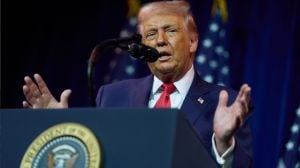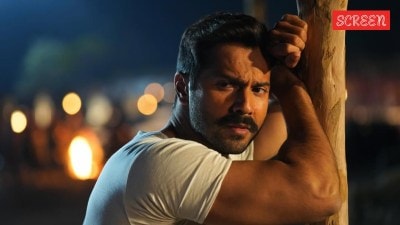Stay updated with the latest - Click here to follow us on Instagram
View of the West
He calls himself a Sundance baby. The internationally-recognised platform allowed scriptwriter William Wheeler,then an NYU film graduate,to make his first film,The Prime Gig. He has since penned several films and TV shows,including the acclaimed The Hoax. A member of the team that adapted The Reluctant Fundamentalist for screen,Wheeler is currently on a trip to India as part of the second Sundance Screenwriters Lab in association with Mumbai Mantra. He talks to Dipti Nagpaul-DSouza about how he lent the Mira Nair movie a western perspective and why it subscribes to the thriller genre.
He calls himself a Sundance baby. The internationally-recognised platform allowed scriptwriter William Wheeler,then an NYU film graduate,to make his first film,The Prime Gig. He has since penned several films and TV shows,including the acclaimed The Hoax. A member of the team that adapted The Reluctant Fundamentalist for screen,Wheeler is currently on a trip to India as part of the second Sundance Screenwriters Lab in association with Mumbai Mantra. He talks to Dipti Nagpaul-DSouza about how he lent the Mira Nair movie a western perspective and why it subscribes to the thriller genre.
Its been a decade since 9/11. Does The Reluctant Fundamentalist then not come too late in the day?
I believe that in the US,the film offers a fresh perspective to 9/11. Most stories about 9/11 in the West have spoken about the horrors,experiences of people directly affected by the incident. I can see why such stories came first because we had to first heal as a country. The collateral damage,such as alienation from the US,especially to people of colour and different ethnic background has remained largely unaddressed. Theres also been a very intense backlash of wars in Afghanistan and Iraq. Now is a good time for America to start listening to these perspectives.
Four people have together adapted Mohsin Hamids book The Reluctant Fundamentalist. Why so many?
Yes,it was Mira Nair (director),Ami Boghani,Mohsin and I. For this book,we felt that more the number of hands on the deck,the better it is. The story brings together several perspectives it has been shot across Delhi,Lahore,Istanbul and the US. We all tried to aptly represent the different cultures. I have tried to provide a perspective on the western characters.
Since 9/11 is so close to your heart,were there ideas in the book that you disagreed with?
My job as a screenwriter did not require for me to necessarily agree with the perspectives in the book they are the characters,not mine,and I made that distinction in my head. But the character does have some very strong views around 9/11. For me,as an American who was in New York with his family on the day of 9/11,the incident was very personal. Putting myself in the shoes of the protagonist,Changez,a Pakistani,helped me understand 9/11 better and made me aware of the collateral damage.
Did you address the concerns by making relevant changes to the script?
I felt the right way to do it is not by making his stance softer. So we created another character,who is an American journalist played by Liev Schreiber,engaged in conversation with Changez. Through him,I was able to put some of my own pushbacks to the book into the film. It gave us space for dialectic and the voice could serve as the western perspective. I always believe in drama where you get two visceral views going at it. That works better than art that tells you of the way to look at the world. But Mira says and I agree with her that the film is a coming-of-age story about someone over the 10 years since 9/11.
While the books narrative is linear,the movie isnt. The screen version also falls under the thriller genre.
The book is an elegant piece,tight in structure essentially a conversation between Changez and an anonymous American who could be CIA or a journalist. Mohsin believed that we needed to open this story up. My role was to point out that maybe there is a bigger story to Changez and the American he is talking to. To do so,we needed to lend it a sense of urgency,which came by turning it into an espionage thriller.
The book has an ambiguous ending,but the film has a neat climax.
It was a conscious move. I believe when you hold on to something too ambiguous,the experience is less satisfying and does not necessarily make you go back to the film over and over again. Cinema is a medium of emotion so we decided to place ourselves in Changezs shoes and play out the implied events after the books last page. In the book too,Changez implies that what is going on will have an intense or violent implication.







